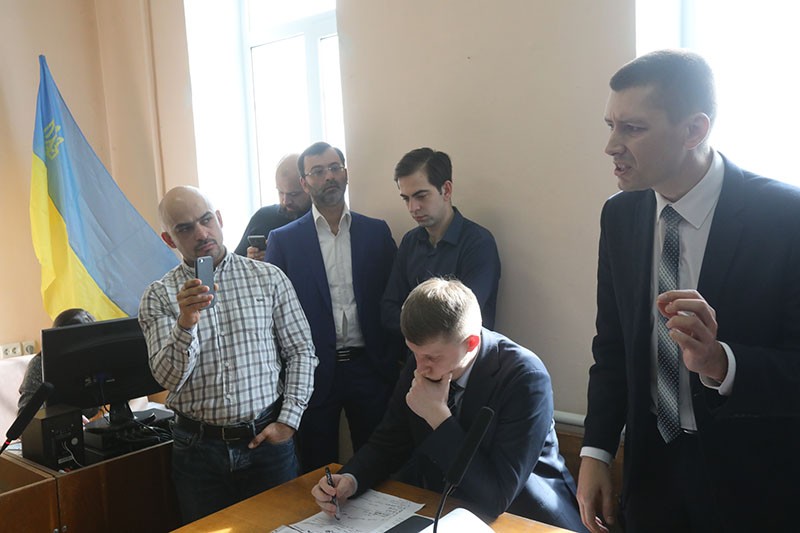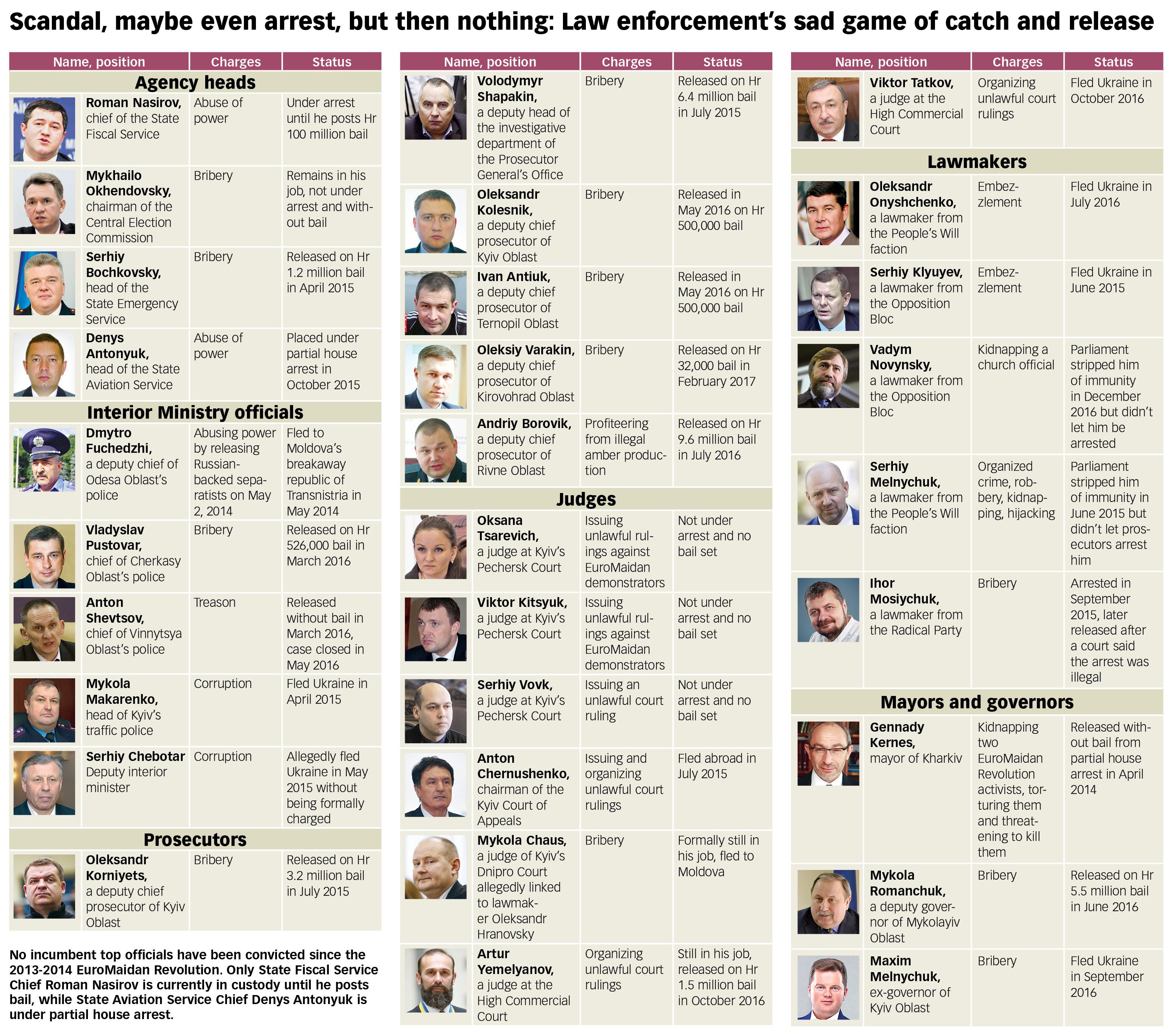State Fiscal Service Chief Roman Nasirov was arrested as a suspect in a graft case by the National Anti-Corruption Bureau of Ukraine on March 2, in the bureau’s biggest breakthrough to date.
Nasirov is the highest-ranking incumbent official to face charges since the EuroMaidan Revolution that ousted President Viktor Yanukovych on Feb. 22, 2014.
The only law enforcement agency not under the direct control of President Petro Poroshenko or his political allies, the bureau has been active for a little more than a year.
Whether this is the start of a true anti-corruption drive is hotly debated. The suspect denies the charges and others who believe he is guilty doubt he will be convicted, given Ukraine’s miserable rule of law.
Ukraine’s notoriously corrupt and politically subservient judges and prosecutors have yet to show any results, even though Ukraine is among the most corrupt nations in the world.
Even in the case of Nasirov, it took several hundred protesters to push the court to do its job: When the court stalled the arrest hearings, protesters blockaded the suspect inside the courthouse until the hearings resumed next day.
Civic activists argue that, unless independent anti-corruption courts are launched, high-profile suspects such as Nasirov will continue to evade justice.
Nasirov, a former lawmaker with the Bloc of Petro Poroshenko, is suspected of suspending taxes for gas trading companies of runaway lawmaker Oleksandr Onyshchenko.
If he starts giving testimony, he could implicate many others.
“If Nasirov testifies against Poroshenko, it could launch the Ukrainian equivalent of the Mani Pulite operation,” reformist lawmaker Sergii Leshchenko said, referring to Italy’s Mani Pulite (Clean Hands) anti-corruption drive in the 1990s.

Anti-corruption prosecutor Andriy Perov speaks during a hearing on State Fiscal Service Chief Roman Nasirov’s arrest on March 5. (Volodymyr Petrov)
Arrested, just barely
After Nasirov’s initial 72-hour arrest period ran out, it seemed that as he had not been officially charged, he could walk free.
It took two days and a rally by hundreds of protesters for Kyiv’s Solomyansky District Court to prolong the arrest for another two months and set a Hr 100 million ($3.7 million) bail, early on March 7. Investigators had asked for Hr 2 billion ($74 million) bail.
Like many officials and politicians before him, Nasirov claimed to have been taken seriously ill on his arrest, at first saying he had suffered a heart attack, but then reducing this to a case of high blood pressure. He was initially wheeled into the court lying on a hospital gurney. Later he was well enough to walk into court and sit beside his team of defense lawyers. Nasirov is suspected of illegally allowing participants of an alleged corrupt scheme at gas producer Ukrgazvydobuvannya to delay tax payments, causing losses to the state of Hr 2 billion ($74 million.)
Unpromising record
There are many stumbling blocks in the Nasirov case that might prevent a conviction. Poroshenko and his allies have consistently tried to restrict the bureau’s independence. They tried to give Prosecutor General Yuriy Lutsenko, a presidential loyalist, the authority to control the bureau, then they refused to give it wiretapping powers and tried to appoint a loyal auditor of the agency.
Given Ukrainian law enforcers’ past record, the prospects of a successful prosecution look grim.
No top officials charged with crimes since the 2013-2014 EuroMaidan Revolution have been convicted or sentenced by a court.
Among incumbent top officials, only Nasirov is currently in custody. Other top officials suspected of crimes have either fled Ukraine or have been released. Meanwhile, the top allies of Poroshenko and ex-Prime Minister Arseniy Yatsenyuk, the lawmaker Ihor Kononenko and ex-lawmaker Mykola Martynenko, have been under graft investigations since 2015-2016, with no progress made and no charges filed.
Among mid-level incumbent officials, the Kyiv Post has found just one court sentence since the revolution: In November, Zaporizhzhia Mayor Oleksandr Sin was banned from holding government jobs for two years for violating labor legislation.
Two mid-level officials are on trial for aiding Russian-backed separatists: ex-Sloviansk Mayor Nelya Shtepa and Toretsk Mayor Volodymyr Sleptsov.
In 2016, only five low-level incumbent officials charged with bribery went to jail: a village mayor, a rank-and-file police officer, a military serviceman, a prison chief, and a tax inspector, according to Nashi Groshi, an anti-corruption watchdog.
Yanukovych allies
Even ex-officials who served ex-President Viktor Yanukovych are escaping justice. The only Yanukovych-era top official on trial in a graft case is ex-Justice Minister Oleksandr Lavrynovych. Ex-Kyiv Mayor Oleksandr Popov, ex-top police official Oleh Marynenko and Oleksandr Shegolev, the former head of the Kyiv branch of Ukraine’s SBU security service, are among the few top officials on trial for cracking down on EuroMaidan activists.
Oleksandr Yefremov, ex-head of Yanukovych’s Party of Regions, is in custody and is being tried on charges of separatism and high treason.
Yanukovych’s Justice Minister Olena Lukash was arrested in late 2015 and immediately released on bail.
In absentia cases against other Yanukovych-era officials have not been sent to trial due to sabotage by Ukrainian law enforcers and legal discrepancies that Ukrainian authorities have failed to address.
Some allies of Yanukovych are even luckier: the corruption cases against his Deputy Chief of Staff Andriy Portnov, ex-Ecology Minister Mykola Zlochevsky and ex-lawmaker Yury Ivanyushchenko have been closed.

Nasirov prospects
Nasirov will appeal against his arrest on March 13 and critics say Poroshenko will intervene on his behalf, which the president denies.
Fugitive lawmaker Onyshchenko, a suspect in the same corruption case that involves Nasirov, has claimed that Poroshenko instructed Nasirov to delay tax payments for Onyshchenko’s gas firms and used the unpaid tax money to finance Poroshenko’s political projects.
Poroshenko has repeatedly denied Onyshchenko’s allegations, dismissing them as a smear campaign orchestrated by the Kremlin.
“The President’s Administration will do its best to make sure that Nasirov is not under arrest,” Vitaly Shabunin, head of the Anti-Corruption Action Center’s executive board, told the Kyiv Post. “The question is whether the appeal court will be able to resist pressure from the administration.”
Shabunin also criticized the Hr 100 million ($3.7 million) bail as small for Nasirov. In his latest income declaration, Nasirov declared $1.16 million, 450,000 euros and Hr 4.35 million – all in cash. He and his wife also own five apartments, three houses and vast land plots, as well as two apartments in London – which Nasirov didn’t declare.
Anastasia Krasnosilska, an expert at the Anti-Corruption Action Center, told the Kyiv Post that the prospects of the case depend on whether “the president’s inner circle guarantees Nasirov safety in exchange for silence, or whether Nasirov will want to testify himself.”
Presidential allies
Several lawmakers from the Poroshenko Bloc have tried to stop Nasirov’s arrest.
Nasirov’s appeal against the Solomyansky Court’s verdict will be considered by Judge Viktor Hlynyany. According to Leshchenko, Hlynyany’s son was appointed last year to the prosecutorial department which is often accused of links to Poroshenko’s gray cardinals and lawmakers Ihor Kononenko and Oleksandr Hranovsky. Leshchenko said he expects the appeal court to cut Nasirov’s bail.
Leshchenko also said that Yaroslav Holovachev, the chairman of Kyiv’s Court of Appeals, who is allegedly linked to Hranovsky, had visited the Solomyansky Court on March 5 to pressure it in the Nasirov case.
Meanwhile, Judge Oleksandr Bobrovnik, who presided over Nasirov’s arrest hearing, ruled in favor of Olga Tkachenko, a former aide of Hranovsky, in a corruption case in 2016.
Two employees of FCLex, a law firm that has serviced Hranovsky, are now defense lawyers for Nasirov.
Hranovsky has denied influencing the court in the Nasirov case and claimed he had had no dealings with the lawyers since 2014. .
But Radio Liberty’s Schemes investigative show on March 9 showed video footage of some of the lawyers meeting with Hranovsky and Kononenko in 2016.
Meanwhile, Oleksandr Ruvin, head of the Kyiv Institute for Forensic Research, tried to influence the Nasirov case by writing a letter to the anti-graft bureau in an effort to invalidate a key forensic examination in the case made by another institute, Schemes reported. Ruvin was filmed meeting with Hranovsky last year.
Schemes also showed footage of Hranovsky’s car leaving the Presidential Administration late on March 6, before the decision on Nasirov’s arrest was made by the court.
Meanwhile, Mykola Tsykur, a deputy commander of the Tornado volunteer unit, claimed on March 9 that he had talked to Nasirov in Kyiv’s Lukyanivske detention facility where Tornado fighters charged with torture are being held. Nasirov allegedly told him that Anatoly Matios, Ukraine’s chief military prosecutor and a Poroshenko loyalist, had visited Nasirov in the Feofania hospital and guaranteed that his bail would be cut and he would be released.
Prosecutor General Yuriy Lutsenko had previously denied Matios’ involvement in the Nasirov case, saying that he had visited his sister at the hospital.
